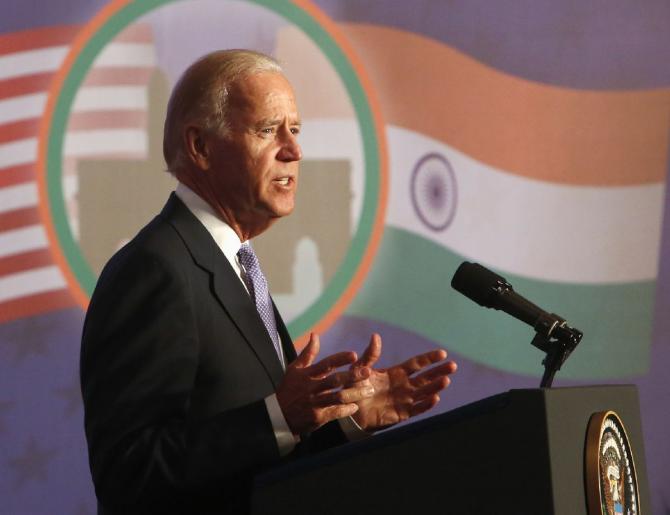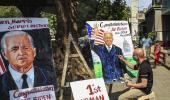It would be a huge achievement if the new administration manages a successful transition to some sense of domestic and international normalcy in these frantic times marked by the pandemic and rise of illiberal regimes across the world, observes Shreekant Sambrani.

All's well that ends well?
Many an earnest Democratic loyalist and sympathiser in the United States had a recurrent nightmare throughout the extended election season of the last spring through autumn: A replay of the 2016 situation, when Donald J Trump, dismissed by all pollsters and pundits as a no-goodnik, went on the defeat the favourite Hilary Clinton decisively where it matters, the electoral college (he did lose the popular vote by over 2.5 million votes, but that became as irrelevant as was George W Bush's similar loss in the popular vote in 2000).
All the polls this year consistently showed the Democratic ticket headed by former vice president Joe Biden and California Senator Kamala Harris ahead of the Republican nominees President Trump and Vice President Mike Pence.
The difference between the two slates was 8 per cent or more, well beyond the normal +- 3 per cent margin of error.
But the 2016 situation was similar, albeit with a smaller lead for the Democrats.
Since the polls did not bear out then, numerous agencies and scholars went out of their way to assure everyone that errors in 2016 had been overcome with better designs of surveys and more sensitive interpretation.
Trump's victory then was due to his wins in the traditionally Democratic bastions of Pennsylvania, Michigan and Wisconsin with razor thin margins.
Therefore, this time around, the polls had singled out these battleground states for special care.
They assured us that Biden-Harris were ahead here as well though with somewhat smaller leads.
A Democratic sympathiser put it aptly: "I worry all the time; my head tells me to believe the polls, but fear lurks in a small corner of my heart."
removed.
Half the world and a nationality away, I, too, felt that anxiety, not just because I shared the abhorrence of Trump with a whole host of others, but for a more personal reason.
I had to abandon a nearly finished commentary on the 2016 results I was doing for Rediff.com and start all over again.
I wanted to avoid that situation at any cost and decided to wait until all ambiguity was
When the results started coming in on the morning of 4 November, the four o'clock nightmare returned.
Trump won Florida and Ohio easily (he was supposed to lose narrowly there) and took quite impressive leads in the so-called blue-wall states of Pennsylvania, Michigan and Wisconsin.
That should have sent Robert Cahaly of the Trafalgar Group over the moon.
This relatively lesser known polling agency had rather enigmatically but correctly predicted the 2016 Trump win in these states.
This time too, Cahaly was confident that Trump would repeat that performance and romp home.
That was a scary prospect to say the least.
I was glued to CNN on television and The New York Times on the computer.
As the mail-in ballots and large urban vote started getting counted, Trump's lead in these battleground states as well as Georgia began diminishing.
And Arizona and Nevada weighed in favour of Biden.
I went through countless iterations of what could get the Democrats to the Holy Grail of 270 electoral votes.
After what seemed an eternity, at about 10 pm on 7 November, three-and-a-half days after the end of voting, CNN finally projected Biden as the victor in Pennsylvania and consequently, of the US presidency as well.
He gave a victory speech 10 hours later.
Trump, of course, has not conceded defeat, claiming that he has won and the later votes are fraud (without any evidence).
He has vowed to wage a fierce legal battle, but that seems destined to lose.
Or so one hopes, because with Trump, nothing goes according any script, including those he himself writes.
***

An election like none other
This election was unique in many ways.
America is no country for old men.
Yet the two presidential contenders in 2020 were both senior citizens, well past their best-before dates, a career politician who has had his senior moments coming out of semi-retirement and an ageing lothario, a tyro in politics, who has been likened to an obese tortoise.
At 78 years and 61 days, Biden will be the oldest president when he is sworn in on 20 January 2021.
Ronald Reagan, who has had that distinction so far, was 77 years and 349 days old when he demitted the office.
Biden's chief rival for the Democratic nomination was an even older Bernie Sanders (79), a political maverick whose socialistic beliefs stand out in the land of free market capitalism.
The vice-president elect, Kamala Harris was the first woman of colour, the daughter of first generation immigrants from the Caribbean and India, to be on the top ticket of any major party.
While postal ballots and early voting are permitted in many American states, their extent has been quite limited historically.
This year, 100 million Americans or two-thirds of all those who voted, exercised their franchise before the election date either in person or through mail.
This was attributed to the fear of crowds in the time of a raging pandemic, but is more likely due to the anxiety among the party faithful (substantially Democratic) about registering their choice before it was too late.
That in turn caused headaches to the counting systems and delays in compiling results; many states are yet to complete the process.
All elections are supposed to be contested on a variety of issues.
There was no dearth of them this time around either: Response to the pandemic, handling of the economy, race relations in the US, climate change and global warming, foreign policy and relations with allies and major powers -- read China and Russia -- all featured in the discussions in the media and the two face-to-face debates between the nominees.
Yet, Trump's positions on all these (and on many other concerns) were so contrarian and bordering on the extreme that he himself became virtually the sole electoral issue.
That made the 2020 contest not so much an election as a referendum on Trump, much the same way the 2019 general election in India was a referendum on Prime Minister Narendra D Modi.
It is commonly believed that Trump has 40 per cent of Americans in his thrall, mostly, but not all, card-carrying Republicans.
He could confess publicly to murder and they would still vote for him.
That gave him an iron grip on the party.
Grizzled veterans with their entire life-times spent in grass-roots politics seemed gladly to accept all his diktats, lest they faced the wrath of their own constituents and get consigned to the dustbin of history.
That is what made it easy for Trump to get the controversial Amy Coney Barret confirmed as a US supreme court justice in record time, flouting every convention of not doing so this close to the election date.
Trump aroused even stronger passions across the political divide.
He and his increasingly quixotic policies were anathema not just to the Democratic mainstream, but also to the intelligentsia and liberal media.
The New York Times carried on a relentless anti-Trump campaign.
Fifteen of its regular columnists including stars such as the Nobel Laureate Paul Krugman, David Brookes and Maureen Dowd wrote on what they thought the Trump presidency had damaged the most.
Their lists include persuasion, innocence, imagination, faith,Pax Americana, generosity, naivete, global standing, conservativism, female empowerment, illusions about America, allies, pride, a sense of reckoning, and sense of empathy, all very grave issues which impacted on the very fundaments American society and polity.
To raise the temperature further, Trump refused more than once to say that he would accept and abide by the verdict of the election.
The time-honoured accepted practice in most liberal democracies is that the loser graciously admits defeat and congratulates the winner.
Al Gore, who had won the popular vote for president in 2000 but lost the Florida electoral college vote by the narrowest of margins, gracefully conceded the election to George W Bush after 36 days of recounts and court battles.
That act is remembered till date as a sign of the maturity of the candidate and the system.
To Trump, this was a sign of weakness, as he hinted many times.
He would fight on - on the basis of what? -- if the vote went against him.
This stance rang alarm bells everywhere.
Democrats hoped that the large leads Biden enjoyed in the polls would translate into a landslide win for him, precluding a possible post-election wrangle.
Ron Suskind, an investigative journalist, put together scenarios of what might happen if the result were to be anything other than a Biden landslide, based on scores of interviews with senior administrators in the justice and security domains.
This was a conspiracy theorists's nightmare.
Suffice it to say that even the mildest of them sent shivers up even my spine, one who has been inured to poll violence and manipulations in the worst of Indian elections.
The election, as it turned out, was far from a landslide.
Biden won the popular vote convincingly, with a margin of over 4 per cent.
But he had to wage a prolonged battle for the 270 electoral votes.
His margins in the frontline states were quite small.
That prompted Trump and his acolytes to cry foul and claim, without an iota of evidence, that the election was 'stolen' from Trump.
He asserted that he was leading comfortably in Pennsylvania when 'miraculously' millions of votes appeared favouring Biden.
Legal challenges have already been filed, although history shows that recounts at best result in adjustment of a very small number of votes, a few hundred at most, not enough to alter the outcome.
Trump, as his wont, will be in denial of the reality staring him in the face.
To him, nothing is worse than being labelled a loser.
As of this writing, he remains defiant, despite reported efforts by some, including most importantly by Melania Trump, to accept the inevitable.
A wag put it pithily. Trump had a full personal experience of the pandemic: He caught the virus, lost his job and now faces the prospect of being evicted from his house!
***

False dawn of post-racial America
How did the ultimate in boorishness, Donald Trump, with no sense whatsoever of morality or loyalty, serial abuser of women, compulsive liar, tax dodger, with vitriolic tongue, trampler of all decency norms (leave alone diplomacy), fancier of dictators and shunner of democrats across the world, and possessing an ego larger than all his properties around the globe, who made an almighty mess of handling the pandemic despite being forewarned that has cost more American lives than all its wars since World War II, manage to capture the imagination of over 70 million Americans and a party that always prided itself as being the inheritor of Abraham Lincoln?
How did he rise so swiftly in what is the world's oldest and arguably the most liberal democracy? These conundrums will continue to trouble us all for a long time.
Barack Obama was the first ever person of colour to win the United States presidency in 2008, much to the jubilation of the whole world.
But his successor Trump refused to denounce White supremacist groups in the billingsgate that passed for the first presidential debate of 2020.
This came in the wake of events in Minneapolis, Rochester, Atlanta, Kenosha, among other American cities, involving use of disproportionate police force against black persons resulting in death or grievous injury, all through the spring and summer of 2020.
Were we premature in celebrating that transformative moment 12 years ago as the beginning of a post-racial America?
Isabel Wilkerson, who won the National Book Critics award for her earlier book, The Warmth of Other Suns, definitely thinks so, in her new book Caste.
She argues most persuasively that some 400 years after the first slaves from Africa landed on its soil, America still rigidly observes a caste system.
It assigns a dominant or subordinate role to people at birth which preordains what they are entitled to, regardless of their abilities and achievements.
A bloody Civil War leading to the abolition of slavery in 1865 and a steady political struggle resulting in the removal of all vestiges of restriction on persons of colour in the wake of the civil rights legislations of the mid-1960s have but altered the situation mostly on the surface.
Wilkerson makes a careful distinction between caste and race.
She says, quite convincingly, 'Caste and race are neither synonymous nor mutually exclusive. They can and do coexist in the same culture and serve to reinforce each other. Race, in the United States, is the visible agent of the unseen force of caste. Caste is the bones, race the skin.
'Race is what we can see, the physical traits that have been given arbitrary meaning and become shorthand for who a person is. Caste is the powerful infrastructure that holds each group in its place.
'Caste is fixed and rigid. Race is fluid and superficial, subject to periodic redefinition to meet the needs of the dominant caste in what is now the United States.'
Wilkerson builds her case step by step, narrating numerous instances of exclusion, injustice, discrimination and even cruelty, from the most brutal years in the slavery era to their very subtle and nuanced variations in the twenty-first century.
She covers events across all walks of life and geographies, from the egregious to the subtle.
She talks of how she herself was at the receiving end on many occasions, even as she made it clear that she was on assignment as the Chicago bureau chief of The New York Times, which her interlocutors often found hard to believe.
This fits in with my conviction that the severe opposition Obama faced in getting the Congress to approve his legislative agenda was primarily due to not-so subtle racism, a view that found few takers among my American friends, but one that Wilkerson fully endorses.
The principal agenda of the current occupant of the White House can be simply summarised as undoing whatever Obama had done.
The race issue is the ugliest manifestation of the fear of the other among people, as much as the religious bigotry we see everywhere is.
As Wilkerson points out, it has troubled the United States throughout its history.
But it receded into the background a little after the historic civil rights enactments of the1960s, notwithstanding sporadic bouts of protests and violence since then.
The onward march of the economy focussed attention on material gains rather than the emotive concern of race.
Increasing prosperity lifted all boats and lulled us into a belief of racism being an issue of the past.
The 2008 meltdown and the recession that followed it shattered this illusion.
Everyone lost, but the working classes most of all.
Income shrank, rather than rise, jobs disappeared, house mortgages and car payments were difficult to make, leading to sizeable foreclosures and repossessions.
Those in the bottom four-fifths of the income pyramid suffered the most.
Unfortunately, the common tendency is to see such adversities as parts of a zero-sum game: if I suffer a loss, someone else must be gaining at my cost.
Such beliefs made it easy for Trump, a classic bigot if ever there was one, to pander to the fear of the other.
His rhetoric centred around how honest, tax-paying Americans were made to pay for welfare-chisellers (read African-Americans in ghettos) and hordes of immigrants laying siege to Fortress America, the land of opportunity.
Worse, all these no-good people had vast numbers of criminals and drug-pushers among them, who bled the great American people.
The evil Democrats not just tolerated, but actually encouraged them, so as to gain their votes.
This message went home to more than 40 per cent of Americans, as did its companion that Trump alone knew how to fix these problems.
His solutions included building a wall at the southern border, hounding out illegal aliens within the US, abrogating trade treaties with countries he did not like and so on.
Whether they worked or not was immaterial as was truth.
Gresham's Law says bad currency drives out the good.
In Trump's America, lies oft repeated in person and on social media by their Commander-in-Chief became gospel truth to his followers.
Other Republican leaders including Congressmen and Senators saw in Trump a path to consolidate their hold on the American voters and went along willingly with his every whim and fancy.
That factor still remains, as indicated by the unwillingness of the party and its congressional leaders to persuade Trump away from his delusional folly of not accepting the Biden victory and his almost certainly doomed efforts to rewrite the election results.
A slim majority favours the Democrats, but the chasm in the American society and polity is real and wide.
***

What can we expect from the Biden administration?
The first priority -- and for some time, the only one -- for the incoming Biden administration is to undo the damage that Trump has wreaked in the last four years.
The president-elect appears to task force to deal with the pandemic was clearly at the top of it.
This largely apolitical group of scientists and professional inspires some confidence.
Biden has also announced his intention of rescinding some measures such as those aimed at children of illegal immigrants (the 'dreamers') tax-cuts that disproportionately favour the rich and big corporations, and concessions and permissions that harm the ecology.
Clearly, all these are aimed at the domestic scene.
The world expects a leadership role from the Americans at all times, but perhaps it is time to give the new administration some breathing space to set its own house in order.
That applies even more urgently to Indian policy wonks and punditry, who are either exuberantly expecting the moon from the new administration given the Harris ancestry, or exaggeratedly fearing the supposed anti-India bias of the Democrats.
Biden has talked about being the president for all Americans and Harris has extolled his healing qualities.
But it would be too much to expect that the US will be able to get over its divisions any time soon.
Such transformational leadership eluded even Obama, among the most enlightened persons to occupy the White House.
Biden could possibly aim at a somewhat smoother journey to some tranquillity.
Lyndon Baines Johnson was able to use his vast Congressional experience to manage the passage of far-reaching legislations through the US Congress.
Biden possesses a similar experience, but was not able to ensure a trouble-free acceptance of the Obama agenda on Capitol Hill.
It is too early to say whether as he will be able to so as his own boss.
It would be a huge achievement if the new administration manages a successful transition to some sense of domestic and international normalcy in these frantic times marked by the pandemic and rise of illiberal regimes across the world.
As Frank Bruni of the New York Times put it in his column admiring Biden's genuine humility, 'The best way to ask for the moon is modestly.'
Feature Presentation: Aslam Hunani/Rediff.com










